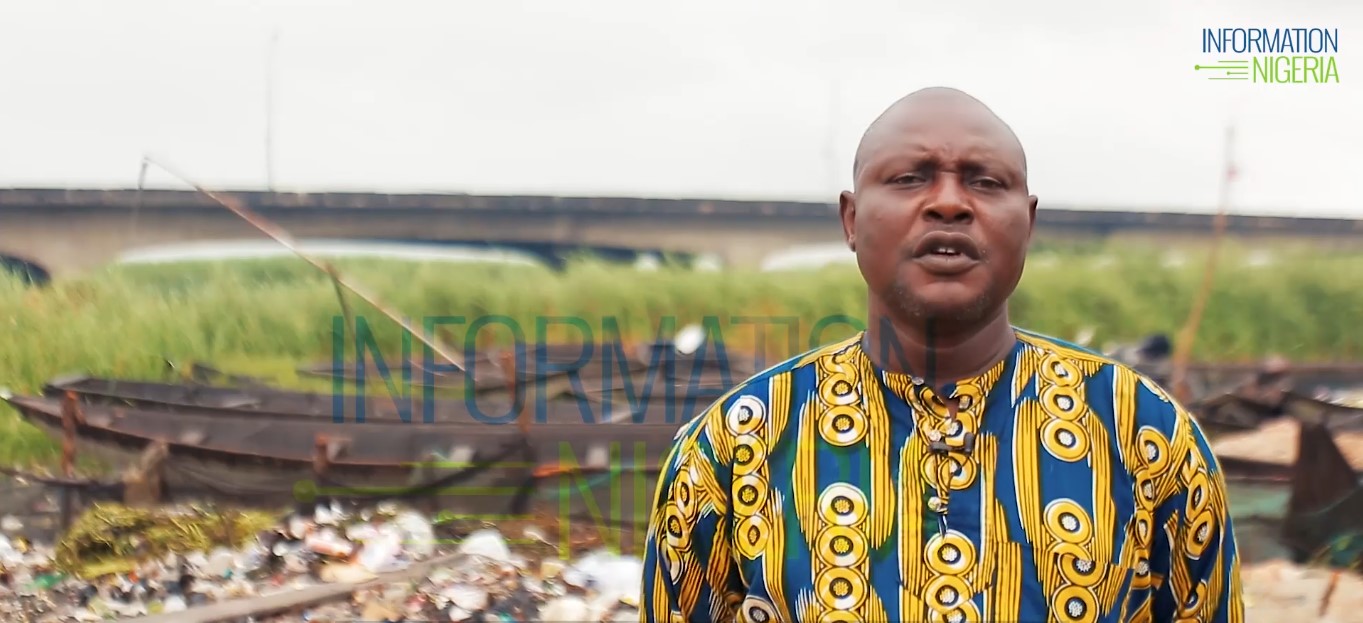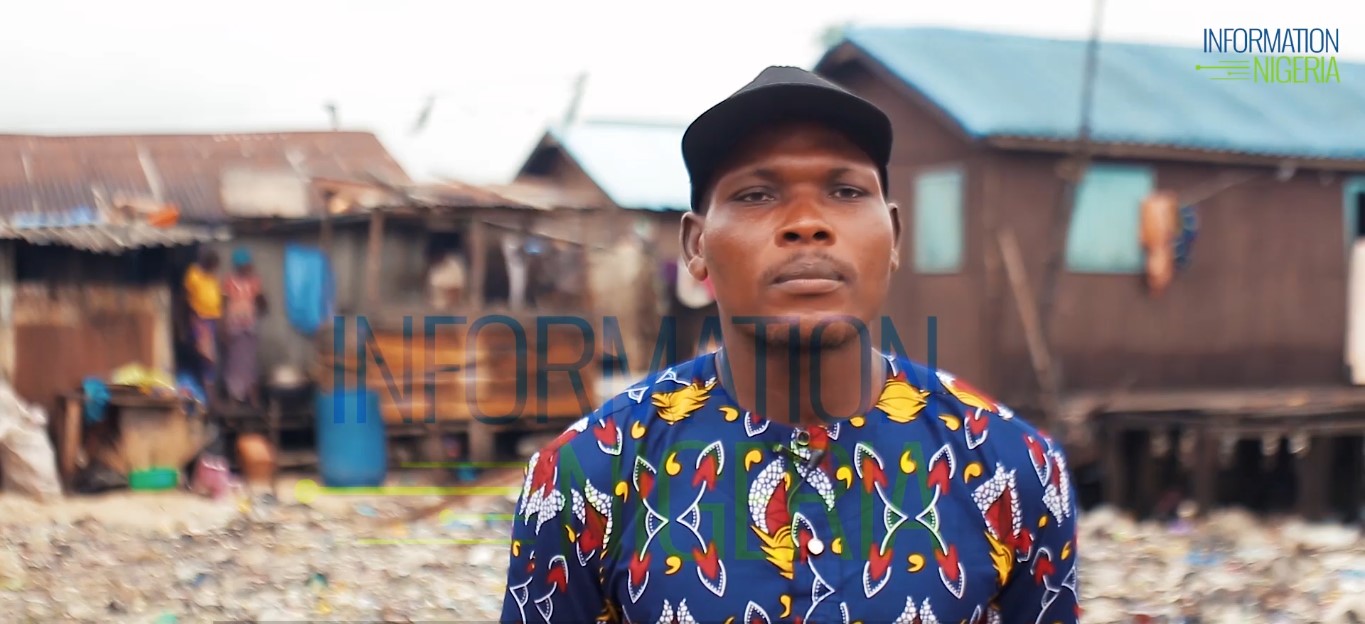
In two separate days, Gbenga Odunsi, Information Nigeria’s investigative journalist, visited a slum in the Bariga Area of Lagos State. His findings evince bad roads, bad walk paths, dirty streets, poor education, murky water, and a stench very hard to get used to — and this is still home to over 5000 residents. In Ago Egun community, Odunsi discovered that the deplorable condition of the community leaves residents cut off from safe access to school, health care as well as employment and other economic opportunities. For residents of Ago Egun, poverty, pollution and disease are a way of life… Odunsi writes.
Lagos, formerly the capital city of Nigeria, is the nation’s commercial hub and most popular city with about 12 million inhabitants. The metropolitan city is filled with beautiful architectural masterpieces and modern infrastructure. Despite its predominantly modern landscape, Lagos has a sprinkling of slum communities — Ago Eegun is one.
In the midst of one of the busiest areas on the mainland, sits Ago Egun, a rather rural area with an entirely low standard of living, where fishing and all activities relating to fish reign supreme. From roasting, drying, and then frying, the people of Ago Egun can be said to be self-sufficient.
A trip to the community evinced that the slum, which has always subsisted on the murky waters of the Lagos Lagoon, remains an eyesore as the unhygienic condition of the dwellers leaves much to be desired.
With children shouting, dancing, posing, pointing; adults staring, some pleasant, most curious, some suspicious, others mocking…Welcome to Ago Egun, the stilt village of Lagos.
On my first day of visiting the community, heaps of refuse, murky water, stench of both material and human waste welcomes me to the fishing community. I, for some minutes, wondered how dwellers of the community survive in such thwarting environment.
The residents live side by side with the growing heaps of refuse erratically dumped in every corner of the community with awful health consequences for residents and visitors, even.
One of the main appearances of the ever-growing slum is the continuous problem of garbage and waste disposal, as well as sewage leakages, especially in the lowland areas coupled with the odious stench from the immensely polluted environment.
Health experts say this sort of environment predisposes coastal communities to faecal-oral infections transmitted by the consumption of contaminated food and water.
The condition is generally regarded as a major health hazard and in particular encourages the spread of infectious diseases such as typhoid, diarrhoea, malaria amongst others.
The everyday life of these squatters, who are mostly Yoruba and Egun, revolves around fishing in a slum that keeps growing bigger and dirtier.
A Slum In Full View
Ago Egun community is not your conventional town. Bad roads, bad walk paths, dirty streets, poor education, dirty water, unhealthy looking children — and this is still home to over five thousand residents.
Then there’s the hustle and bustle of human activity: women smoking fish or vending food and bric-a-brac; semi-unclad children playing on the verandas of wooden shacks; some community women gossiping and laughing; and some youths drinking in a local gin spot.
I carefully walked through creaky rough paths that lead to almost anywhere in the community, watching my footsteps not to step on faeces. Amidst all its imperfections, all the residents are not dampened or withered. They take each day as it comes and dream of a better tomorrow. They have created avenues to smile and be happy.

Business Activities In Ago Egun
The economic structure of the community is simple. The men fish in the sea, and the women smoke the fish on circular wire grills. For a fishing community like Ago Egun, fishing is unquestionably the main source of livelihood.
The people of Ago Egun have made a living from fishing ever since their families first settled on the edge of the lagoon more than 50 years ago.
But these dwellers have graduated from poverty to extreme poverty in Nigeria just few years ago. Today, nobody fishes in Ago Egun anymore. Residents lamented over the dredging project the Lagos State Government embarked on in 2017.
In May 2017, a company, Nigerian Westminster Dredging and Marine Limited, started a land reclamation project on the edge of the Lagos Lagoon. The land reclamation project, which is opposite the community, is being done on the behest of the Lagos State government.
But as the reclamation of the 29.6 hectares site for the project continues, the misery of inhabitants of Ago-Egun deepens. Silt flowing from the dredging site towards the community completely blocked the fishermen’s route to the Lagoon. The men now stay at home, while the women cater for the family by selling smoked and roasted fish, and other odds and ends.
Most men here have more than one wife. It is the duty of the woman to nurture the children and set them on the right path.
Residents of the community, in separate interviews with Information Nigeria, expressed their displeasure over the present predicament of the community. Many highlighted the lack of basic amenities as the core challenges confronting the community.
According to Ajagun Francis, a resident and also Chairman of Fishermen and Women Association, “Before government commenced dredging project, we go into the lagoon to catch fish, being our major occupation here.
“After fishing in the lagoon, we come back home and our wives smoke and sell the fishes.
“That is how we have been making ends meet.
“Now, we can no longer access the lagoon for fishing due to the dredging project by the state government.
“We barely feed well these days; our wives have been the ones feeding us.
“Our children no longer go to school because we do not have money to pay their school fees.
“However, we thank God for providing little for us to sustain.
“We are begging the Lagos State government to come to our rescue.”

Basic Amenities Still A Daydream For Ago Egun Residents
Another resident, Tunde Agemo, says “we are aware that government builds hospitals for other communities but we don’t know why we have been abandoned here.
“Our community lacks health centre, schools, and water system.
“We often buy water from Aboki; and when they don’t come around, the community suffers.
“We are appealing to the state government to provide us with these basic amenities of life.
“All the men in this community are being fed by their wives, this is due to the dredging project embarked upon by the state government.
“Our wives go to the market to sell fish, come back home to feed us, and children with the little proceed from the fishes sold.”

The difficulty associated with access to other basic services like health care, access to potable water, schools, and toilet system are nightmares especially for pregnant women and people who have emergencies.
These dwellers, who live in shacks, built on stilts, lack healthcare centre. Residents of the community say they trek miles to get access to healthcare centres in Bariga and CMS.
Pregnant women in Ago Egun give birth at home with the help of traditional birth attendants. In 2015, approximately 303, 000 women died either during or following pregnancy and childbirth with 99% of these deaths occurring in the low-resource countries.
These deaths occur as a result of unavailable, inaccessible, unaffordable, or poor quality care, especially at the point of delivery.
The hygiene and environmental conditions of Ago Egun community are unsurprisingly hazardous, exacerbated by a lack of toilets. Information Nigeria gathered that most residents have developed a strong immunity to the unhealthy conditions, which often overwhelm visitors — many of whom have fallen ill after visiting the community. Even at this, inhabitants of the community live in total disregard of the health and environmental hazards posed by such an unhygienic condition.
In Ago Egun community, there are no toilet facilities. Open defecation among the Egun people is standard. The community lacks functional toilet system. Inhabitants wait till night time to openly defecate in the black murky water located somewhere within the community. The toilets are built right on the lagoon and the waste adds to the floating debris in the lagoon. Those who are unable to wait, release their excreta right there on the street.
Nigeria has been ranked second among countries practising open defecation globally, says the United Nations Children Fund. Dr Geoffrey Njoku, Communication Specialist, UNICEF made this known at a Two-Day Media Dialogue in Calabar State in August 2019. According to him, findings from the 2018 Water sanitation and Hygiene National Outcome Routine Mapping survey reveals that 24 per cent of the population, about 47 million people, practise open defecation.

Youths in Ago Egun are barely educated. The community lacks in both primary and secondary schools. Some residents say their children trek two hours to get to their school. Even the educated ones can barely speak English fluently.
Rowland Kasumu — a 12-year old, dark and averagely tall boy — says he attends St Luke Junior Grammar School in Bariga. According to the JSS 2 student, “I go late to school every day because there is usually no water to bath in the morning
“I have to go hustle for water first, before bathing and getting ready for school.
“Most times I get to school very late. I end up missing morning assembly.”
Ajagun had earlier said the community lacks educational centre, and “when the young ones are going to school, the parents follow them all the way to CMS as most of them are too young to cross the ever-busy road without a guardian.”
Youths who are unable to attend school due to the long-distance and high cost of school fees, play in the many rickety and abandoned boats that drift on the black murky water amid the piles of faeces, waste and garbage floating outside their parent’s shabby shacks.
Youths, with ages ranging between 17-24, lazy around the community, drinking local gin and extorting money from visitors to the community. This, it could be said, is the comeuppance of the community without economic opportunities.
Nigeria has the ‘largest number of children out-of-school’ in the world. Recall that Minister of Education, Adamu Adamu, during ministerial screening at the Senate, announced that the number of out-of-school children in the country now stands at over 16 million. Adamu noted that out-of-primary-school children stood at 10 million, while children out-of-secondary-school are six million. The former minister blamed the high number on poor funding of education in the country by states and the federal government. Nigeria’s 10.5 million out-of-school children are the world’s highest number.
Access to portable drinking water is difficult. Despite living close to the lagoon, Ago Egun residents buy water from Aboki, popularly known as ‘Meruwa’. According to some residents, when meruwa does not bring water, the community suffers.

Hazy Hope
The future is tentative for Ago Egun residents since the land is not legally inhabited and a slum upgrade also seems implausible.
The community is currently at threat of eviction promoted by the Lagos State government, which intends to construct an extension of the luxurious neighbourhood of Victoria Island and to clean the image of the megacity.
Residents say they have had an uncountable number of meetings with Bariga Local government Chairman and his representatives to tender their plights to the state government. Apparently, their pleas have been falling on deaf ears.
One can only hope that Lagos state government rise to the occasion by extending government projects to this community, pending when the community will go into extinction. Accordingly, new political leaders have a huge task before them, like Ago Egun, which is still undeveloped and uncivilised.
Watch Full Video:




